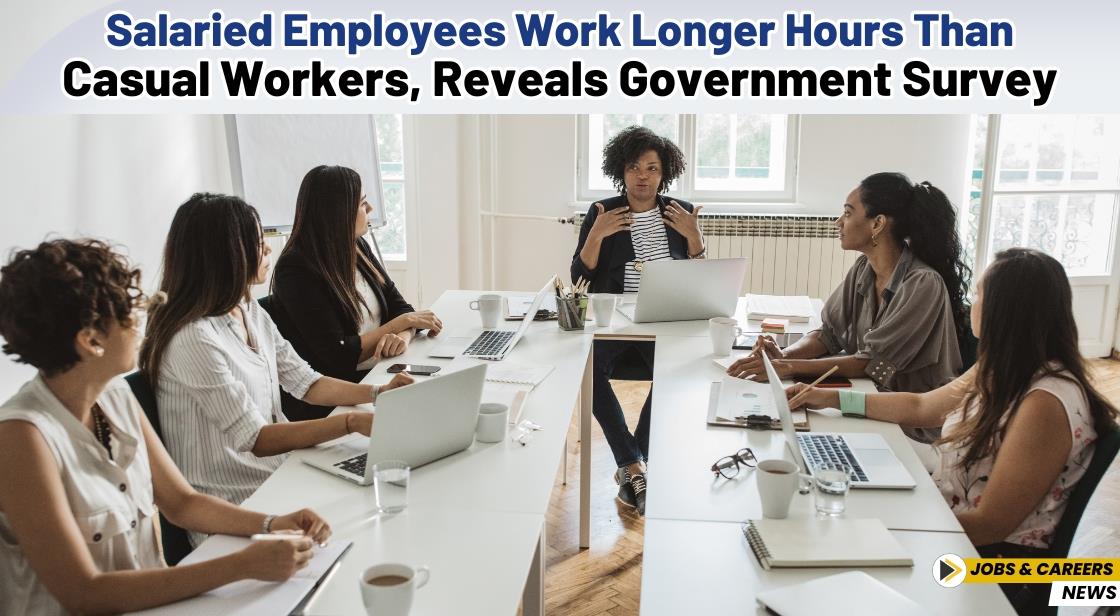Salaried Employees Work Longer Hours Than Casual Workers, Reveals Government Survey

News Synopsis
A recent government survey has revealed a concerning trend in the modern workplace—salaried employees, particularly those in corporate settings, are consistently working longer hours compared to their casual or self-employed counterparts.
This finding is part of the Periodic Labour Force Survey (PLFS) for July 2023-June 2024, which highlights the stark difference in work hours across various employment categories.
According to the survey, regular wage earners are putting in an average of 48.2 hours per week, significantly higher than the just under 40 hours reported by casual laborers and self-employed individuals.
This disparity not only emphasizes the intense work demands faced by salaried employees but also brings to light the evolving corporate work culture, where employees are often pushed to meet tight deadlines, high expectations, and ever-increasing productivity goals.
For many salaried workers, particularly those in corporate environments, a 48-hour workweek translates to approximately 9 hours of work per day for a five-day workweek, or about 8 hours per day for a six-day workweek.
These long hours have led to growing concerns over employee well-being, with many questioning whether the benefits of working extended hours outweigh the potential impact on mental and physical health.
The Growing Pressure on Salaried Employees
While human resource experts have differing views on the long hours salaried employees clock, the general consensus is that it’s not merely the number of hours that matter—it’s the high-pressure environment in which these hours are spent. Many corporate workers find themselves in an unrelenting cycle of constant hustle, tight deadlines, and mounting stress, with little relief in sight.
The 48.2-hour average workweek highlights a growing trend in many industries, where salaried employees are expected to go above and beyond to meet performance goals. Experts argue that the pressure to deliver results, coupled with a lack of work-life balance, is pushing employees to their limits. The toxic idea that long hours equate to dedication continues to persist in corporate environments, often at the expense of employee health.
Different Stresses for Casual Workers and the Self-Employed
Interestingly, while salaried employees bear the brunt of long working hours, casual laborers and self-employed individuals face their own challenges. According to the PLFS survey, these workers tend to work fewer hours—just under 40 hours per week—but they often deal with income instability and irregular schedules.
For self-employed individuals, the flexibility of setting their own hours can be a double-edged sword. Their work is highly dependent on market demand, and unlike salaried employees, they do not have the safety net of a stable paycheck.
Casual workers, on the other hand, may have more predictable schedules, but their overall working hours and income fluctuate based on availability of work.
Workplace Stress and Tragic Consequences: A National Debate
The conversation surrounding work hours and employee well-being gained nationwide attention following the tragic death of Anna Sebastian Perayil, a 26-year-old employee at Ernst & Young in Pune. Her death, reportedly linked to extreme work-related stress, has sparked a nationwide debate on the toll long hours and high-pressure work environments are taking on employees.
In the aftermath of the tragedy, the government launched an investigation into the impact of long working hours and the broader work culture prevalent in the country. The incident has raised questions about the need for companies to reassess their approach to deadlines, expectations, and overall employee health.
Many experts are calling for a shift in mindset—arguing that businesses should promote a more balanced work culture that values productivity within reasonable limits and discards the notion that working long hours is a measure of an employee's commitment.
The Need for Change in the Modern Workplace
As the link between work-related stress and employee health continues to dominate headlines, one thing is becoming clear: the current work culture, especially for salaried employees, is unsustainable. The long hours that salaried employees are forced to work, combined with the unpredictability faced by casual workers and the self-employed, are creating a work environment that needs urgent reform.
A healthier work-life balance is no longer just a luxury for employees—it’s becoming a necessity. Businesses and organizations must recognize that sustainable productivity comes from employees who are healthy, engaged, and supported in their roles.
For salaried workers, the issue goes beyond just managing hours; it’s about creating a work environment that prioritizes employee well-being, offering them a sense of fulfillment without the relentless pressure of long hours. For companies, the message is clear: it’s time to prioritize employee health over outdated notions of productivity.









